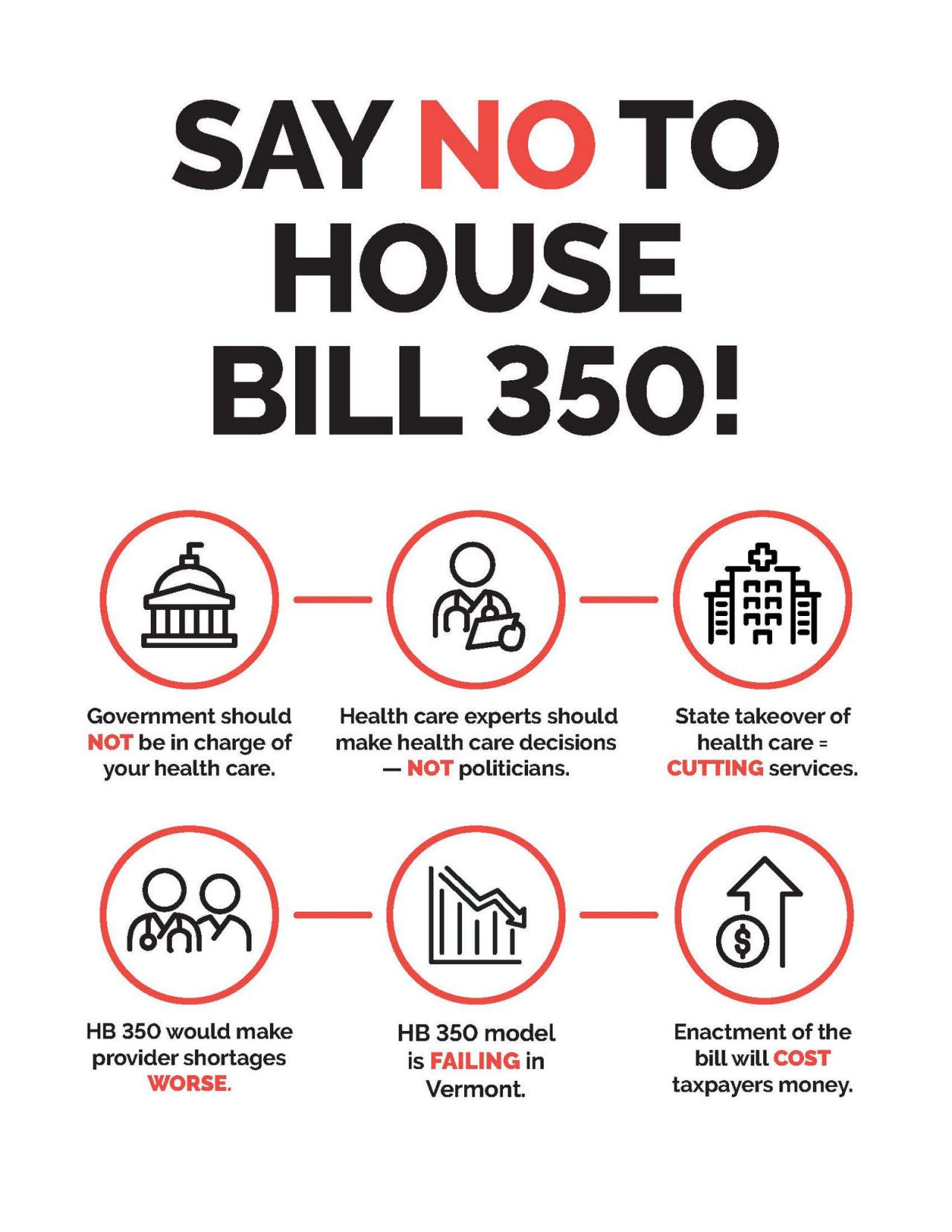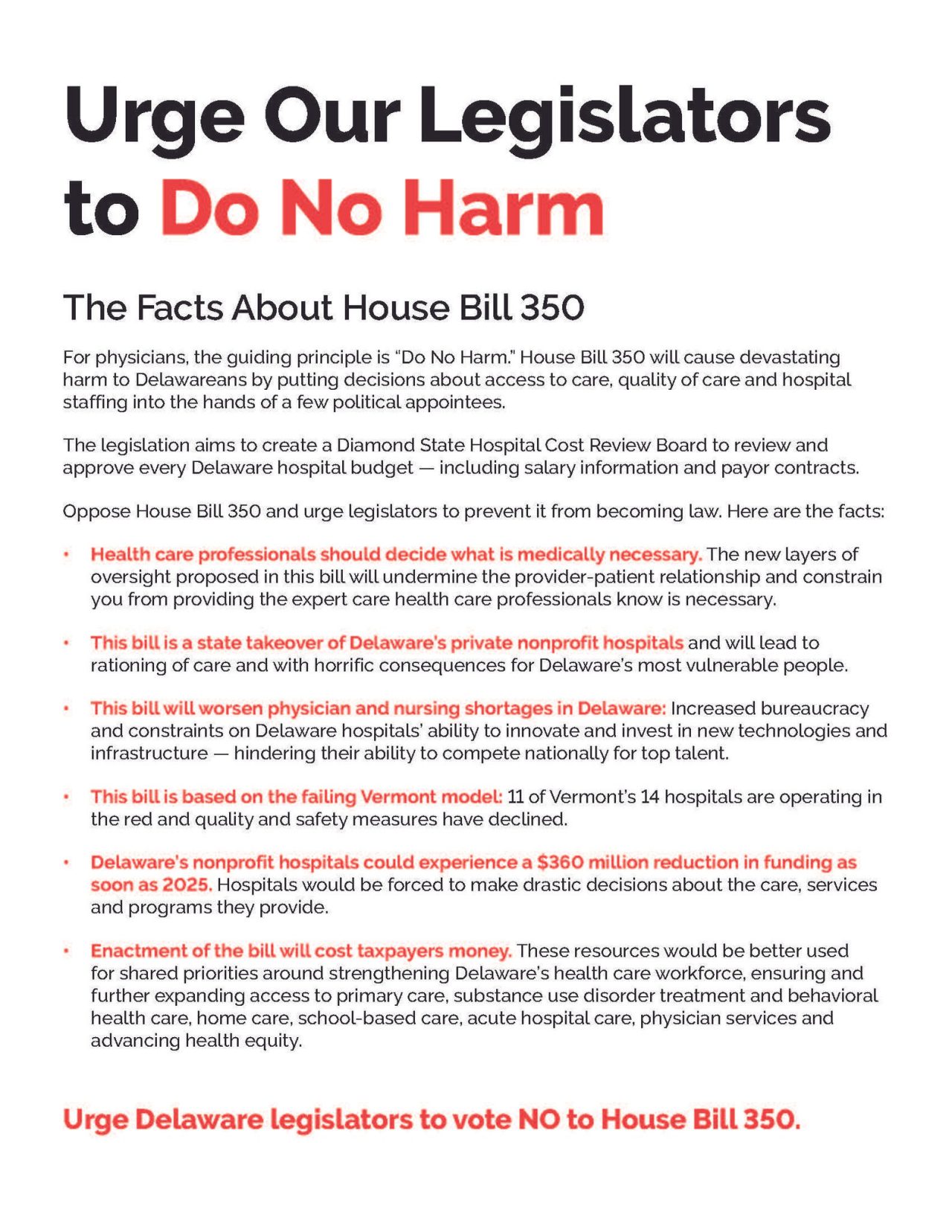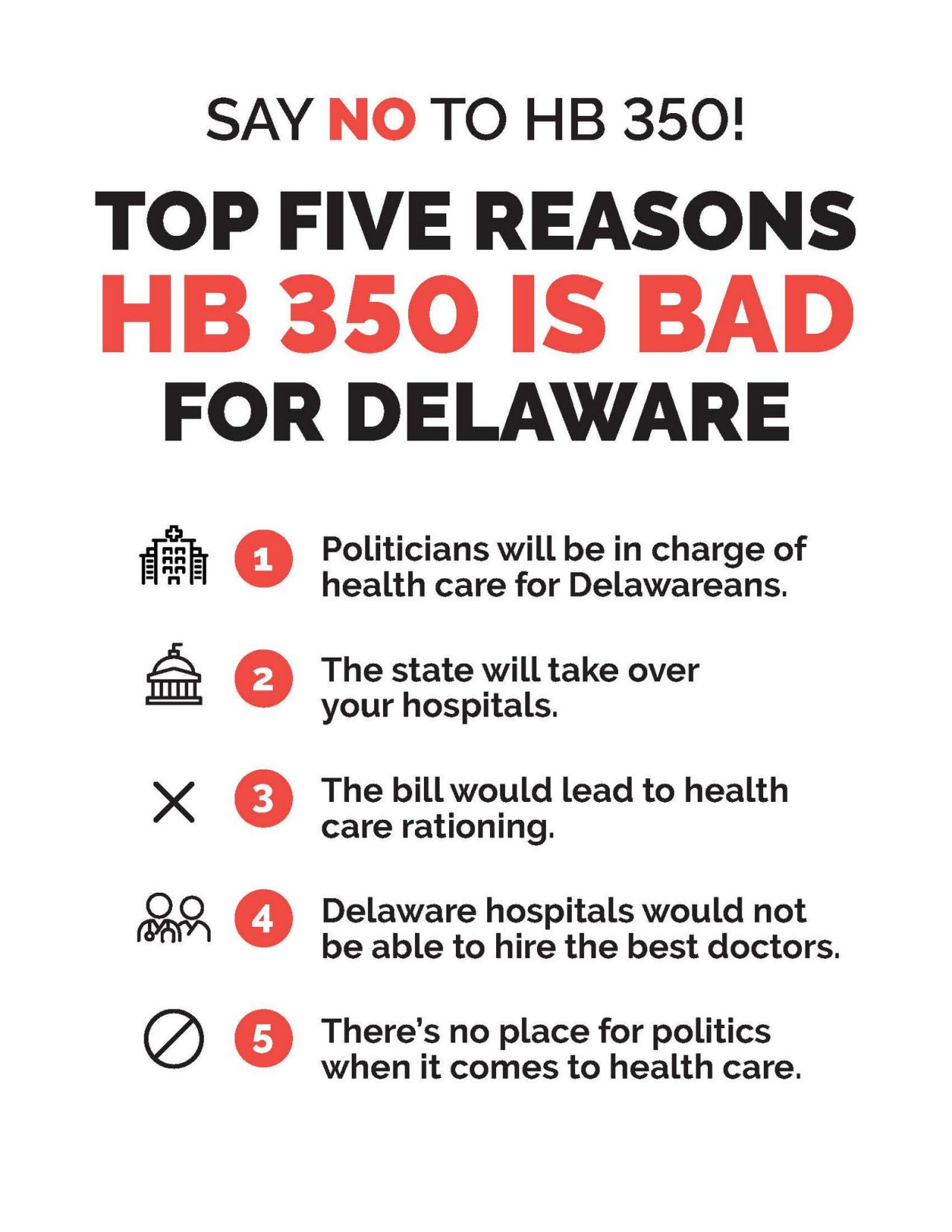Login
Urge Our Legislators to Do No Harm
For doctors, the guiding principle is “Do No Harm.” House Bill 350 will decimate Delaware’s health care system and cause devastating harm to Delawareans by putting decisions about access to care, quality of care and hospital staffing into the hands of a few political appointees.
The legislation aims to create a Diamond State Hospital Cost Review Board to review and approve every Delaware hospital budget — including salary information and payor contracts. The bill will:
The new layers of bureaucratic oversight proposed in this bill will undermine the doctor-patient relationship and constrain health care professionals from providing expert care that is needed in our community. Under the bill, a politically appointed oversight committee, the Diamond State Hospital Review Board, will be in charge of hospital budgets, making health care decisions impacting all Delawareans, especially its most vulnerable people.
These political appointees will face pressure from interest groups and lobbyists, and could potentially take ideological stances that are out of step with evidence-based best practices in health care, as we see increasingly happening in politically polarized communities around the nation. The intricate and very personal decisions affecting the health and wellbeing of Delawareans should rest in the hands of those with expertise in health care – physicians, not politicians.
Delaware’s hospitals are nonprofit 501(c)(3) organizations that are mission-driven to meet the health needs of our diverse communities and to reinvest into the communities to expand and improve health access, equity, quality and affordability. This bill is an unprecedented takeover of a private, nonprofit industry by the state that goes much further than any similar legislation in the United States, including the failing Vermont model that it was based on. A provision in HB 350 would require hospitals with yearly revenue that exceeds Delaware’s health care financial benchmark to hand over that money to the state. This provision, like the entire bill, is grossly unfair and would do nothing to improve health care or reduce the cost of care for average people in Delaware. Quite the opposite: It would severely harm the ability for Delaware’s nonprofit hospitals to invest back into the community, and it would put Delaware’s health systems at a competitive disadvantage to the health systems across our borders in Maryland, Pennsylvania and New Jersey
The bill will severely restrict Delaware hospitals from attracting and retaining talented health care professionals – at a time when workforce shortages are already a national crisis. Bureaucratic control of hospital budgets will dampen innovation, clinical research and creativity and create a stiflingly negative professional climate for doctors, nurses and all health care professionals. Job candidates have already expressed deep concerns about this bill and its impact.
Thirteen years ago, Vermont passed a law similar to this bill. Over that time, health care costs in Vermont have not been meaningfully controlled, and quality and safety measures have declined. Vermont continues to be among the most expensive states for health care in the nation, while hospitals are unable to make substantive changes, grow or invest in needed infrastructure because of the rigidity of government oversight.
Eleven of Vermont’s 14 hospitals are currently operating in the red and lack needed predictability during this already uncertain time in health care.
The outlook gets worse when considering that Vermont and Delaware are not at all similar demographically. Vermont is far less diverse than Delaware, with a 94% white population and only 3% of people without health insurance, compared to Delaware, which has a much more diverse population with 68% white and 8.7% of people uninsured. Vermont’s population is shrinking, Delaware’s is growing—and much of that growth is retirees, who are older and require more health care.
The Vermont model is not working, and many in Vermont are trying to undo this model and the damage that it has caused. We MUST learn lessons from other states and prevent this mistake from happening in Delaware.
Because of caps that this bill places on health care pricing to all payors, this bill will force Delaware hospitals to slash $360 million from their budgets as early as 2025. Hospitals in the City of Wilmington could lose up to $200 million. Hospitals would be forced to make difficult decisions about which services and programs to eliminate or reduce. These cuts would need to focus first on programs that do not generate revenue, because these programs would be unsustainable without additional funding. These programs include medical research and many health outreach programs that support underrepresented communities.
This bill also attempts to hold hospitals accountable for costs that are out of their control. The state established a spending benchmark in 2019 that is set to 3-4% per year to keep health care costs from rising. But hospital labor costs (around 60% of the hospital budget) are rising at around 6-10%, and drug prices (around 20% of the budget) are rising at around 8%. Despite that, hospitals have met or come close to meeting that benchmark every year except 2021 when there was increased spending following the COVID-19 pandemic.
The bill requires only the hospitals to be responsible for meeting the health care benchmark, leaving out pharmaceutical companies who set drug prices, insurance payers who set premium rates—and the state’s own employee health care plan—from good faith efforts to lower costs.
The cost to fund the Diamond State Hospital Review Board will be about $1 million a year. Rather than create a new state bureaucracy, these resources would be better used for shared priorities around strengthening Delaware’s health care workforce, ensuring and further expanding access to primary care, substance use disorder treatment and behavioral health care, home care, school-based care, acute hospital care, physician services and advancing health equity and so much more.




